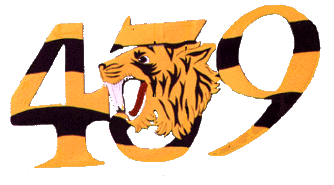|
History
of
 Squadron Squadron
  
Chapter
IV
The
Battle of Normandy
June
- August 1944
Intentionally
left blank.
|
The first two operations on 9 August were
routine; a target near Clair Tizon was bombed by the whole Wing to "soften" the enemy preparatory (1) to a ground attack,
and the Bois de St. Clair was battered with 18 bundles (2) of TNT, producing
a large red flash caused probably by exploding petrol. On this sortie the
Wing tried a new formation, the aircraft flying in sections of three line
abreast. It was designed to save space on wing shows, but most of the pilots
claimed it was unwieldy and did not provide adequate protection against air
attack. The wood was on alternative target, attacked because red smoke
shells, which were to pinpoint the primary objective close to our own lines,
did not appear.
|
The
day's third mission proved to be a "prize
package".
Enemy forces dug in at a small village were offering stout resistance
to our troops who called for an air strike. Nine pilots, led by F/L
Ken Scharff, responded. "The
heavy haze had dissipated somewhat by this time and the target was
quite easily approached from the north-west at 6,000 feet. An almost
vertical dive attack was carried out from the south-east right down to
1,000 feet. All bombs landed where they were aimed (!) and the entire
west half of the village seemed to rise into the air. F/L Scharff led
the boys back in a beautiful strafing attack from the south-west at
1,000 feet right down to the tree tops. All fields, bushes and roads
leading into the village of Jean Blanc from this direction were
viciously sprayed by cannon fire.
At this point our own artillery dropped more red smoke-shells
on the north-west corner of the target so we roared in again with
cannons barking. This
time the attack was pressed home until some of the aircraft were in
danger of being hit by ricochets as they zoomed over the village. A
small orchard at the north-west corner was sprayed unmercifully in
this attack and the Jerries there had to be a long, long way down into
their slit trenches to escape it. A large wooden house at the edge of
the orchard was burning furiously and the entire village was choked in
a mantle of smoke and dust. On the last attack the pilots turned away
in a steep turn between the central church and the adjacent buildings.
In this case to say that the mission was successful in a gross
understatement even if written with a capital “S”.
The pilots returned to base jubilant at the close support they had
given the Army."
|
|
Close support was likewise the program for the 10th
to assist our troops fighting their way down the highway to Falaise to
close the gap with the Americans driving up from the south. Two wings
struck enemy mortar positions in a valley near Ouilly-le-Tssson, some
eight miles north of Falaise covering the area with bomb bursts. One
large explosion was observed, sending a column of smoke high into the
air. Light flak was so intense that strafing runs could not be made. On
the next sortie, however, flak was conspicuously absent and the eight
pilots led by F/O Monson were able to strafe as well as bomb. In the
initial dive they made two direct hits on some buildings housing a
German headquarters at Ranes; then they came in again to sweep the
entire area with 20 mm slugs. One building was burning furiously, and
five men were seen dashing for cover in slit trenches.
  
Copyright ©1998-2016 Michael T. Melnick. All rights reserved the unofficial homepage of  Tiger Squadron Tiger Squadron . . ..
|
|